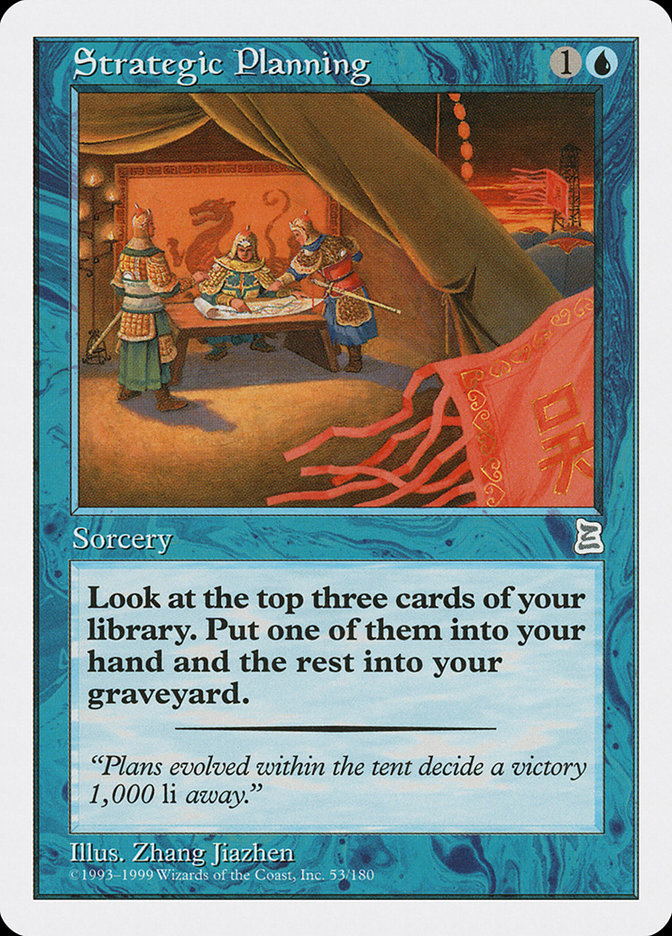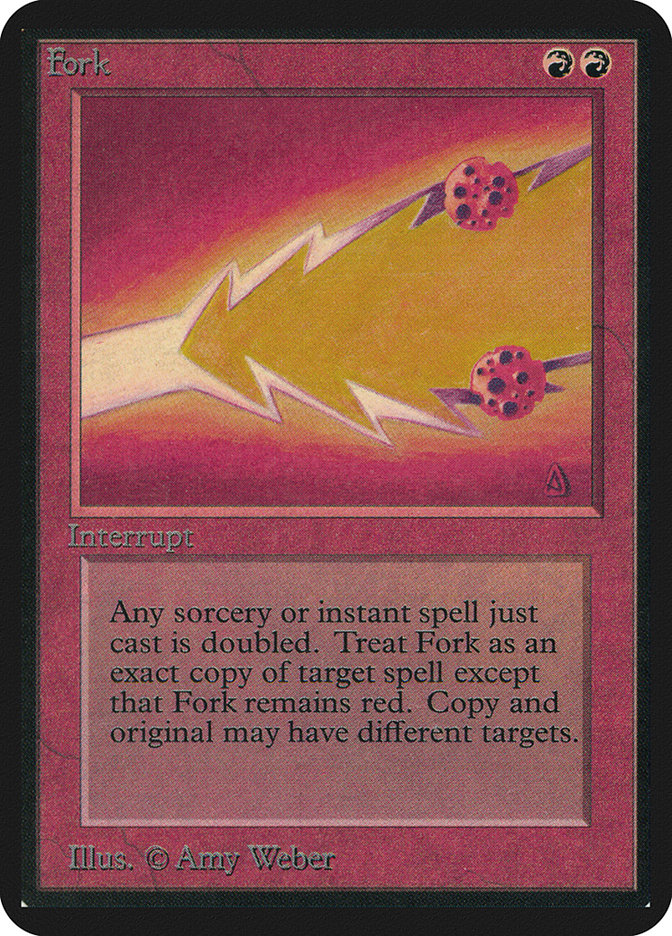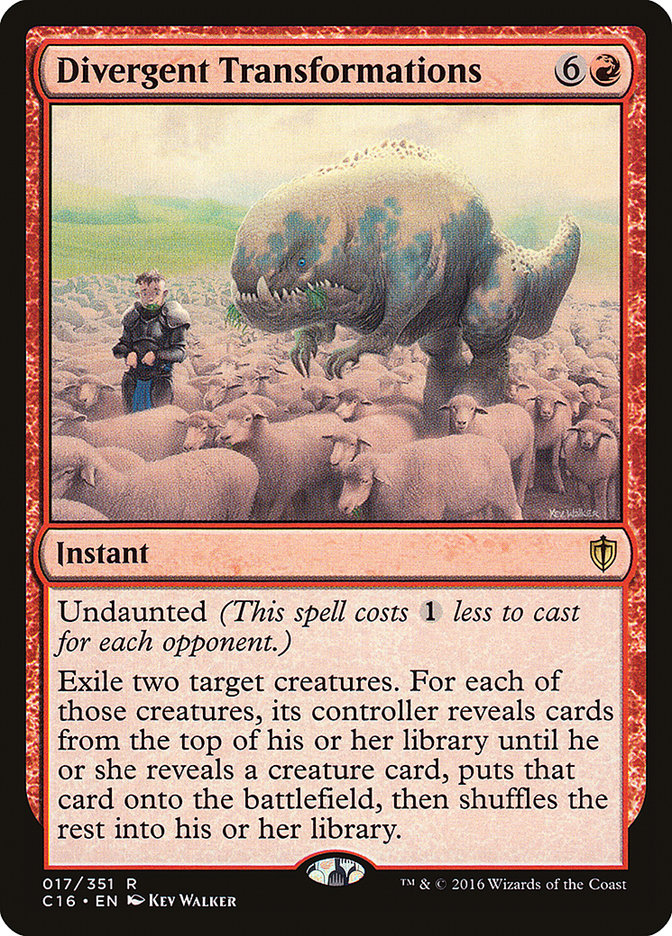Research // Development Carta MTG
| Custo de mana | |
| Custo convertido de mana | 7 |
| Raridade | Rara |
| Tipo | Mágica Instantânea |
| Lançamento | 2006-05-05 |
| Expansão símbolo | |
| Expansão nome | Dissension |
| Expansão código | DIS |
| Número | 155 |
| Frame | 2003 |
| Layout | Dividir |
| Border | Preta |
| Ilustrado por | Greg Staples |
Texto da carta
Coloque em jogo uma ficha de criatura vermelha 3/1 do tipo Elemental, a menos que um oponente permita que você compre um card. Repita esse processo mais duas vezes.
Cartas similares a Research // Development
Navigating through the intricate phases of card advantage in MTG, Research // Development stands out within its unique dual-card feature. Echoing elements found in the likes of Strategic Planning, which sifts through the top three cards of a deck, providing players the choice to keep one, Research // Development introduces a broader selection at a five-card glimpse. Unlike Strategic Planning, Development doesn’t limit the choice to nonland cards and Research allows another spell to be replicated, albeit from outside the game.
When taking a side-by-side look with Fork, which duplicates any single instant or sorcery spell, Development offers up a craftier counterpart. It may mandate the spell to exist outside the current match, giving an atypical, premeditated angle to gameplay. Divergent Transformations is similarly transformative yet more unpredictable. It exiles two creatures and then manifests top cards from the library into creatures, ramping up the element of surprise
Assessing the multifaceted applications of Research // Development within MTG’s pantheon of spells, it garners recognition for its flexibility and the strategic depth it contributes, setting a distinct standard in deck versatility and potential card advantage strategies.
Card Pros
Card Advantage: Diving into the core benefits of Research // Development, this card grants you a significant edge by allowing you to not only draw a card with the Development side but also to deploy multiple threats into your deck with Research. This dual-aspect design ensures that you stay ahead in resources, making it a versatile choice for maintaining control over the game’s flow.
Resource Acceleration: The strategic depth of Research // Development shines in its ability to churn through your deck, setting up potential for an explosive turn. By filling your deck with copies of potent spells or creatures, you’re effectively accelerating your resources and setting the stage for a powerful play. This can often translate into a formidable board state that your opponent must address.
Instant Speed: The instant speed nature of Development offers a layer of flexibility, showcasing its strength within MTG interactions. This allows you to adapt to the unfolding game, keeping your opponents guessing and forcing them to play around potential responses. This instant speed utility enables you to maximize your mana each turn, whether you’re casting spells on your turn or waiting to disrupt your opponent’s strategy.
Card Cons
Discard Requirement: In the stages of research and development, a card might necessitate players to discard one or more cards. This can hinder a player’s hand and reduce their available options, potentially stripping them of crucial resources they may need later in the game.
Specific Mana Cost: A stringent mana requirement can make a card less flexible, especially if it demands an exact combination of colors. This can limit the card’s inclusion to decks that can consistently generate the specific mana types needed, reducing its overall versatility across different deck builds.
Comparatively High Mana Cost: A card in development might have an elevated mana cost that doesn’t align with its impact on the game. When a card’s effects do not justify its mana expense, it risks being overlooked in favor of lower-costing alternatives that offer similar or greater value, potentially affecting its playability and popularity upon release.
Reasons to Include Research // Development in Your Collection
Versatility: Research // Development offers a unique flexibility, allowing players to dig through their library for answers or beef up their presence on the board with unexpected token creatures.
Combo Potential: The Development side of this card can produce numerous tokens for synergies with mechanics like populate or convoke, while Research can facilitate finding the right pieces for complex combo setups.
Meta-Relevance: With the ability to adapt to various metagames, either through token generation to apply pressure or sifting for keys to outmaneuver opponents, Research // Development remains a strategically advantageous choice.
How to Beat
The process of developing new cards for MTG, particularly in the Research and Development stage, can sometimes yield powerful results that challenge players. Understanding the meta-game, including how cards are crafted and introduced to the ecosystem, is key to finding ways to counter them. Opposition to a potent Research and Development card requires a keen sense of strategic play and deck building finesse.
When facing such cards that have been meticulously designed for impact, consider sideboard options that neutralize their advantages. This might mean including cards that disrupt the opponent’s strategy or using removal spells that can target key pieces, effectively dulling their impact. Assess if counterspells, direct damage, or perhaps hand disruption offers the best line of defense. Adaptability and resource management come to the forefront, demonstrating how understanding of the game’s deeper mechanics is crucial for turning the tides in your favor.
To summarize, overcoming a sophisticated Research and Development card is more than just a single tactic. It is about crafting a versatile strategy that anticipates and dismantles the opponent’s plan, ensuring that you retain control of the game’s direction and momentum.
Onde comprar
Se você deseja comprar um cartão Research // Development MTG de um conjunto específico como Dissension, há diversas opções confiáveis a serem consideradas. Uma das principais fontes é a loja de jogos local, onde muitas vezes você pode encontrar boosters, cartas individuais e decks pré-construídos de conjuntos atuais e de alguns conjuntos anteriores. Eles geralmente oferecem o benefício adicional de uma comunidade onde você pode negociar com outros jogadores.
Para um inventário mais amplo, especialmente de conjuntos mais antigos, mercados on-line como TCGPlayer, Card Kingdom e Card Market oferecem seleções extensas e permitem que você pesquise cartas de conjuntos específicos. Grandes plataformas de comércio eletrônico, como eBay e Amazon, também têm listagens de vários vendedores, o que pode ser um bom lugar para procurar produtos lacrados e achados raros.
Além disso, o site oficial do Magic geralmente tem um localizador de lojas e listas de varejistas para encontrar a Wizards of the Produtos licenciados pela Costa. Lembre-se de verificar a autenticidade e a condição dos cartões ao comprar, especialmente de vendedores individuais em mercados maiores.
Abaixo está uma lista de alguns sites de lojas onde você pode comprar os Research // Development e outras cartas MTG:
 COMPRAR
COMPRAR BurnMana é parceiro oficial da TCGPlayer
- eBay
- Card Kingdom
- Card Market
- Star City Games
- CoolStuffInc
- MTG Mint Card
- Hareruya
- Troll and Toad
- ABU Games
- Card Hoarder Magic Online
- MTGO Traders Magic Online
Veja produtos de MTG
Legalidades
Magic the Gathering formats where Research // Development has restrictions
| Formato | Legalidade |
|---|---|
| Commander | Válida |
| Legacy | Válida |
| Modern | Válida |
| Oathbreaker | Válida |
| Vintage | Válida |
| Duel | Válida |
| Predh | Válida |
| Penny | Válida |
Regras e informações
O guia de referência para regras de cartas de Magic: The Gathering Research // Development fornece decisões oficiais, quaisquer erratas emitidas, bem como um registro de todas as modificações funcionais que ocorreram.
| Data | Texto |
|---|---|
| 2006-05-01 | Development’s effect is repeated three times no matter which option the opponent chooses. The opponent may choose a different option each time. You’ll wind up with three Elemental tokens, two tokens and a card, one token and two cards, or three cards, whichever your opponent chooses. |
| 2006-05-01 | In a multiplayer game, each opponent, in turn, has the option to let you draw a card. If no opponent does, you put a token onto the battlefield. Then the process repeats two more times. A different opponent may let you draw a card each time. |
| 2009-10-01 | A card “from outside the game” may be a card from your collection or a card from your sideboard. In tournament play, you can’t choose a card from your collection. The cards you choose don’t all have to come from the same place. |
| 2009-10-01 | The exile zone is a part of the game, so you can’t get exiled cards. |



